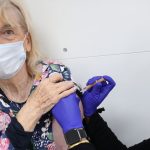A young woman emerged from the Estadio do Dragao with a Chelsea scarf draped around her shoulders and a tear-stained face.
“I was sobbing at the final whistle,” she said. “This was truly the best day of my life. I will never forget this moment.”
Her boyfriend felt the same.
“After everything that we’ve been through in the last year with the pandemic, just being here and back inside a stadium felt magical, and then the result to top things off, amazing,” he said.
It is these emotions that have been stripped from football by the pandemic – but here in Porto, they were restored in technicolour.
Last season, the Champions League trophy was lifted before empty stands. Now the players were able to celebrate with loved ones and joy burst from their every pore.
At the far side of the pitch, Chelsea goalkeeper Edouard Mendy’s mum raced down from the stands.
Clutching a World Duty-Free plastic bag in one hand and a Chelsea flag in the other, she held her son tightly for a long while.
Mendy had been unemployed at the age of 22 and feared a football career would elude him.
Now he has won the biggest prize in European club football.
His manager Thomas Tuchel, who only took over from Frank Lampard in January, was similarly elated, bringing his two daughters onto the pitch and passing them the famous Champions League trophy to hold.
The German lost the Champions League final with PSG last season but outsmarted his opposite number Pep Guardiola in Porto.
Portugal stepped in as hosts for this final just two-and-a-half weeks ago, replacing Istanbul after Turkey was put on the UK government’s travel red list.
But you wouldn’t know they had only entered the fray at the 11th hour judging by how the city was transformed for the occasion.
The Avenida dos Aliados is one of Porto’s main streets, known colloquially as the city’s “ballroom”, a nod to the grand buildings and the fact that many local celebrations happen here, whether sport-related or government festivities.
In front of the city hall, fans took selfies beside an enormous inflatable Champions League trophy.
Chelsea supporters spilled out from bars and cafes onto the pavements, drinking, cheering and singing an ode to their striker, Timo Werner.
If it wasn’t for the face masks, mainly being worn by locals rather than the visitors, it could have been a pre-pandemic scene.
“I think it’s fine because we’re all being sensible,” said Donna from London. “We’ve all had our PCR tests – now it’s just about getting back to normal life.”
Some local people here fear that tourism money has been prized above public health, particularly with concerns about new coronavirus variants being imported here from the UK.
But most taxi drivers or waiters in the city say they are happy to have foreign visitors returning.
It is not just concerns about coronavirus that the local government has had to tackle in such a limited timeframe.
Any major event of this scale requires a security and policing strategy and the Portuguese have done a good job here, being assertive but not aggressive to tackle any hint of trouble on the horizon.
There had been a 16,500 ticket allocation for the Estadio do Dragao. In the end, only 14,110 showed up – although the excellent acoustics in the 50,000 seater arena made it seem much more full.
Soon, stadiums across Europe will be full again and, for all the debate about whether having fans travelling across the continent is an unnecessary risk, they certainly lifted the occasion.






















